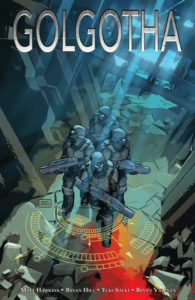 Golgotha
Golgotha
Publisher: Top Cow
Writers: Matt Hawkins & Bryan Hill
Artist: Yuki Saeki
Colorist: Bryan Valenza
Letterer: Troy Peteri
Cover: Raffaele Ienco
Golgotha opens abruptly as protagonist Michael Lawton, a grizzled veteran special forces operator, languishes under military tribunal. His last chance at redemption after a horrifying miscalculation in the field is as a crew member aboard the ill-fated interstellar vessel Golgotha. This decision sets him on a path of monumental personal and scientific discovery at the cost of everything dear to him. Unbeknownst to Lawton and his crew, unanticipated scientific advancements prompted a unified Earth government to dispatch a second expedition a short time later. The second vessel departs earth for the same planet with the same aim, and will arrive decades before the Golgotha completes its 80 year voyage. Upon arrival the older vessel is shot down, killing all but two of the crew. To his surprise, Lawton finds the thriving mining colony Achilles, governed by his own grandson, now physically decades his senior.
Matt Hawkins and Bryan Hill delivered an enthralling premise for this sci-fi epic, it’s just a shame they don’t seem to have very much faith in the humanity of their characters or the attention span of their audience. The duo sprints through the narrative, hitting plot points with clinical precision, but I’m honestly left wondering why I should care about these characters at all. Do not misunderstand, if you feel my words are harsh, it’s only because of my disappointment at an opportunity squandered. This is an very talented team that I feel just isn’t digging deep enough to tap the emotional register the concept can muster. Even artist Yuki Saeki’s very competent execution comes across as by-the-numbers storytelling. I really hoped for more risk- taking.
My last review of a Hawkins book was Samaritan: Veritas #1, and I’ve drawn many of the same conclusions here. He’s a very knowledgeable writer who has a lot to say, but he seems unwilling to commit to those themes and mores he touches on; dismally brief flashes of brilliance that he refuses to examine in the moment. So while they’ll insert a blatant homage to Conrad’s Heart of Darkness and intimate the veracity of humanity’s exogenesis, a la Prometheus, Hawkins and Hill seem content to keep the referential elements superficial. I’ll admit it’s great for pacing, but the end result is ultimately a threadbare experience wanting for a touch of subtlety. Also disappointingly shallow, the characters don’t feel particularly lifelike. They’re cutouts on rails, without a consistent emotional thread to hook the reader in.
Like its’ namesake, the colony Achilles unwittingly obscured, but eventually succumbed to a fatal inborn flaw. While not destroyed, it was irrevocably changed, quite literally in contravention of its intended purpose. But I guess that’s a matter of perspective. As it was not once imbued with any vibrancy nor vitality beforehand, and its’ denizens were barely depicted, in the end what was the yield of the Golgotha’s events from the reader’s perspective? A remote vanity constructed on behalf of the human race, the colony may as well be a mausoleum. What manner of civilization now resides in utero, among Achilles’ authoritarian regime and industrial trappings? Perhaps the next iteration will forego Golgotha’s narrative humility and deliver on a more icarian progression. I’m more than willing to pick it up to find out because, in spite of my criticisms, Golgotha is a thought provoking accomplishment. One sure to satiate fans of Hawkins’ previous work.
Christian Davenport

